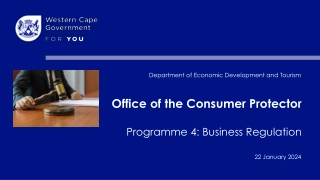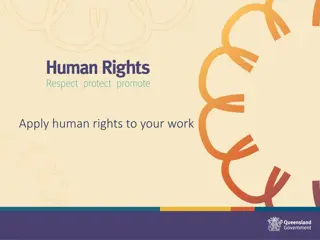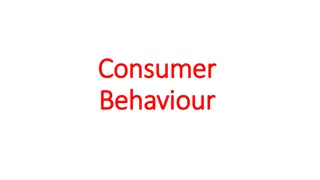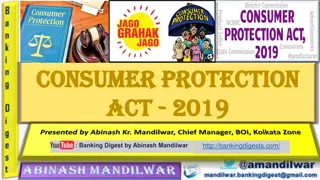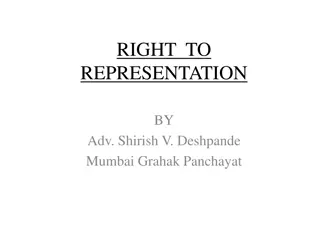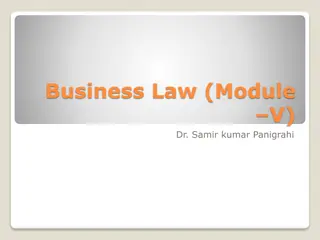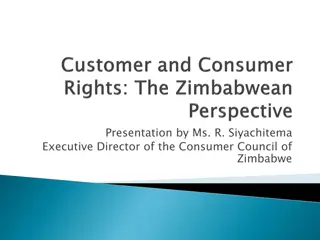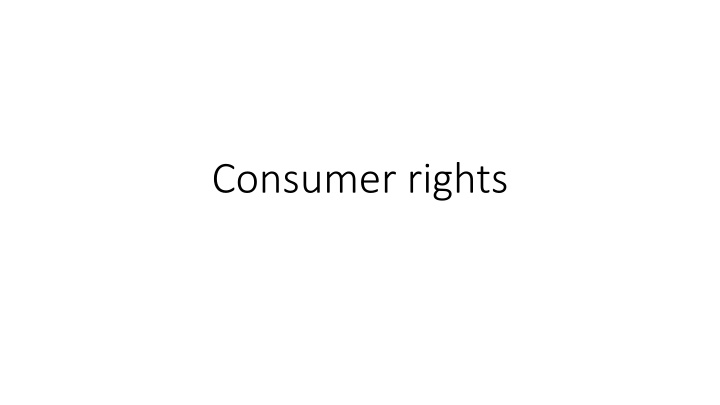
Consumer Rights: Safety, Information, Choice & More
Explore the fundamental consumer rights, including the right to safety, information, choice, and redressal. Learn how consumers are protected against hazardous goods, deceitful information, and empowered to make informed decisions in the marketplace.
Download Presentation

Please find below an Image/Link to download the presentation.
The content on the website is provided AS IS for your information and personal use only. It may not be sold, licensed, or shared on other websites without obtaining consent from the author. If you encounter any issues during the download, it is possible that the publisher has removed the file from their server.
You are allowed to download the files provided on this website for personal or commercial use, subject to the condition that they are used lawfully. All files are the property of their respective owners.
The content on the website is provided AS IS for your information and personal use only. It may not be sold, licensed, or shared on other websites without obtaining consent from the author.
E N D
Presentation Transcript
The right to safety The right to be informed The right to choose The right to be heard The right to seek redressal The right to consumer education
The right to safety Means right to be protected against the marketing of goods and services, which are hazardous to life and property. Before purchasing, consumers should insist on the quality of the products as well as on the guarantee of the products and services. They should preferably purchase quality marked products such as ISI, AGMARK, etc.
For example: Tools and appliances must include safety devices for your protection. Federal laws ensure that clothing, food, toys, and other items will not harm consumers. The U.S. Consumer Product Safety Commission enforces product-safety standards.
The right to be informed Consumers have the right to receive accurate and complete information so that they can make informed choices and decisions. It is important because through this right consumers can be protected against fraudulent , deceitful or misleading information This right gives the consumer right to get informed about the quality, quantity, purity, potency, standard and price of goods and services so as to be protected against unfair trade practices.
For example: 1. Drugs companies must list the complete contents of all the medicines so that the consumers remain well informed about the medicines they are consuming. 2. Clothing manufacturers must list the fibers used in materials so that the consumers can be protected from falling prey to high pressure selling techniques 3. Packaged foods must show all ingredients, with the main one listed first.
The right to choose Means right to be assured, wherever possible of access to variety of goods and services at competitive price. This right can be better exercised in a competitive market where a variety of goods are available at competitive prices. For example: this right gives the consumer a right to choose the product or service from a wide variety of competing good and services as per their will. They take decision on the basis of price , quality and the improved services provided by the seller.
The right to be heard Means that consumer's interests will receive due consideration at appropriate forums. It also includes right to be represented in various forums formed to consider the consumer's welfare. Consumers who have complaints about products or services have a right to be heard.
For example: If you buy a bike helmet from a sporting goods store. After wearing the helmet a few times, you find that the chinstrap keeps coming loose. You have the right to let the store know you are not satisfied with the helmet. Businesses rely on customer satisfaction. The purpose of the customer service department is to listen to the concerns of customers.
The right to seek redressal Means right to seek redressal against unfair trade practices or unscrupulous exploitation of consumers. It also includes right to fair settlement of the genuine grievances of the consumer. Consumers can also take the help of consumer organizations in seeking redressal of their grievances.
The right to consumer education Means the right to acquire the knowledge and skill to be an informed consumer throughout life. Ignorance of consumers, particularly of rural consumers, is mainly responsible for their exploitation. They should know their rights and must exercise them. Only then real consumer protection can be achieved with success. Consumers have the right to learn how a market system works. They should know how to get the best value and satisfaction for their money.
Laws to protect consumer Consumer protection act, 1986 Consumer courts Indian Contract Act, 1972 The Sales of Good Act, 1930 The Essential Commodities Act, 1955 The Agricultural Produce (Grading and Marking ) Act, 1937 The Prevention of Food Adulteration Act, 1954 The Standards of Weights and Measures Act, 1976
The Trade Marks Act, 1999 The Competition Act, 2002 The Bureau of Indian Standards Act, 1986 IT Act, 2000

